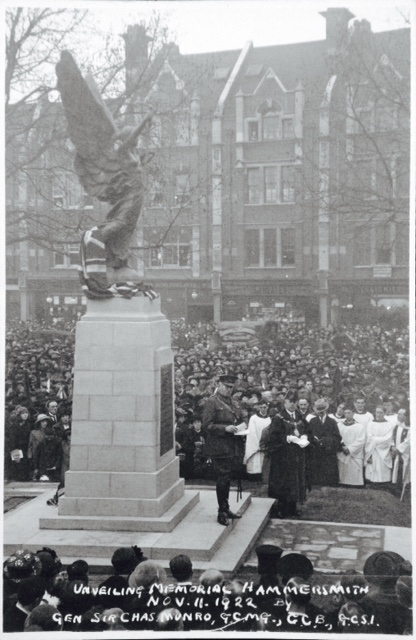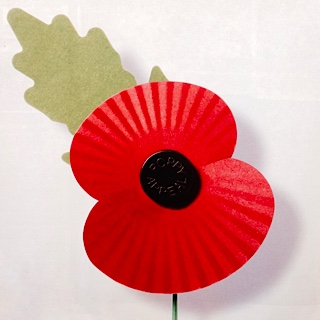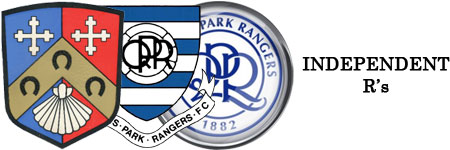The following servicemen had at some time in their careers played for Queen’s Park Rangers and all tragically lost their lives serving their country:
Corporal Albert ‘Ben’ Butler – Apart from playing for QPR, he was also the first professional footballer in the ranks of the 17th Middlesex to be killed in action.
Albert Bonass – He joined the R’s in 1939 and later became a reserve policeman before joining the RAF. Between 1940 and 1945 he guested for a number of clubs including; Fulham, Watford and Southampton, but lost his life when his Stirling bomber crashed in Yorkshire during a training flight in 1945.
Charlie Clarke – Played in six league games for QPR between 1936 and 1938. He was a Luton Town player at the time of his death in March 1943.
Alan Fowler – Alan guested a few times for the R’s in 1940/41 and also in 1943/44, but was actually on Swindon Town’s books. Sgt. Fowler served in the Dorsetshire Regiment and lost his life in July 1944 following the D-Day landings.
Evelyn Henry Lintott – Our first full England international, Lintott was killed whilst leading his men of the 15th West Yorkshire Regiment on the first day of the Battle of the Somme.
Frank Cannon – He began his career with Hitchin Town whilst working for a firm of solicitors. After making 29 appearances for the Rangers he moved on to West Ham. Later he served with the Bedfordshire Regiment before transferring to the Essex Regiment, rising to the rank of Sgt. Major. He was killed by shrapnel at Ypres on 15th February 1916.
Joseph Dines – Apart from winning more than 30 amateur caps for England, he also played in all three matches in the 1912 Olympics in Stockholm for the Great Britain team which won him a gold medal. Joseph was one of three brothers to enlist but only survived hostilities for eleven days. He was cut down on the Western Front by machine gun fire on 27th September 1918.
Albert Edwards – Made 17 1st team appearances for QPR, Albert also played for Bristol City and Newport County, but lost his life in the Great War.
Oscar Horace Stanley Linkson – Sadly lost his life on 8th August 1916. His mother never accepted that her son was dead, choosing to believe that he had run away to escape what she believed to be an unhappy marriage.
Harry Vernon Thornton – He made 37 appearances for the Rangers and scored 10 goals. Harry was one of many other players to join the Footballer’s Battalion and later died in France.
John H. Pennifer – Arrived at QPR in 1913 and after just 3 appearances, he enlisted the following year. John was one of the many fatalities at the Battle of the Somme.
Corporal John Tosswill – John made 3 appearances for QPR before joining the Royal Engineers. He became a dispatch rider and returned home after being wounded. Sadly, he passed away, aged 24, on the operating table in Eastbourne Military Hospital on 28th September 1915.
And Dennis Higgins who played 30 times for the Rangers and joined the Sportsmen’s Battalion. He eventually became an officer but was so badly injured at Ypres in Flanders that he never played again.
Also to be remembered are two Rangers fans who sadly lost their lives in the recent conflict in Afghanistan:
Lance Corporal Tom Keogh – He came from the Hallfield Estate in Paddington and was only 24 when he died from a gunshot wound in Sangin, Helmand Province.
Acting Corporal David Barnsdale – 33 Engineer Regiment (Explosive Ordnance Disposal). He was the same age as Tom and was killed clearing explosive devices. His parents laid a wreath on the Loftus Road centre circle prior to the Burnley home game in 2010.

In 2009 Dan Hodges wrote the following article for the local Gazette:
‘For many of us, preparations for Remembrance Sunday may be limited to buying a poppy and planning where we will be to mark the two-minute silence. But for a handful of former service personnel working in a factory next to the Thames in Richmond, the work is continuous, as it has been for more than half a century.
With a dedication that would shame many of us, a team of about 50 people, mostly disabled veterans, work all year round to produce the 38 million remembrance poppies required each year, and the 900,000 crosses and 100,000 wreaths that will be laid at war memorials around the country on Sunday.
The origin of this astonishing feat dates back to 1922, when Major George Howson MC, a young infantry officer and engineer who served on the Western Front in the First World War, founded the Disabled Society to help disabled ex-servicemen and women. He suggested to the British Legion that society members should make poppies, and the paper flowers were designed so that someone who had lost the use of a hand could also assemble them.
The factory’s own history records how, with a grant of just ¬£2,000, Major Howson set up a small factory off the Old Kent Road with five veterans, crafting the first poppies soon afterwards.

In a letter to his parents at the time, he said: “I have been given a cheque for ¬£2,000 to make poppies with. It is a large responsibility and will be very difficult. If the experiment is successful, it will be the start of an industry to employ 150 men. I do not think it can be a great success, but it is worth trying. I consider the attempt ought to be made if only to give the disabled their chance.”
Within a few months the number of employees had risen to 50, providing work and an income for many people who might not have been able to find it elsewhere. As demand increased, the enterprise outgrew its premises and the factory was moved to Richmond, not far from where the current premises opened in 1933.
According to the factory’s history, the origins of the remembrance poppy lie with two women. One was Moina Bell Michael, an American teacher, who was so moved by the poem ‘In Flanders Field’, by Colonel John McRae, that she bought poppies with money collected from her work colleagues and sold them to raise funds for ex-servicemen in the US. In 1920 the poppy was proclaimed her country’s national emblem of remembrance.
The following year, Madame Guerin, a French woman, sold millions of poppies throughout the US to raise funds for rehabilitation in areas of France devastated by the First World War. She also sent French women to London to sell poppies and she persuaded Earl Haig to adopt the poppy for the British Legion.
Since 1922, all poppies have been manufactured in Petersham Road, Richmond, where the veterans’ continuing commitment to their solemn task shows no sign of abating.’
WE WILL REMEMBER THEM
Steve Russell
(The above postcard is from my collection and commemorates the unveiling of the Hammersmith Memorial by General Sir Charles Munro on 11th November 1922)

A sobering article which reflects how many families have been affected by such losses over the years.
My own family suffered disproportionately in WW1 with my Great Grandfather and his Brother being killed in 1917 and 1918 and a further brother fortunately survived.The brother killed in Arras had survived being injured in France after campaigns in Italy and with the Tunnelling Brigade and had just returned to the front when he was killed.
Such a senseless loss of life and my family was changed forever. As I have said before all children should be taken to one of the Commonwealth War Graves in France or Belgium to appreciate the sacrifices made for their future.
We will remember them.